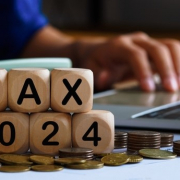Romney Child Tax Credit Proposal Could Be A Lifeline — But It Has Some Big Flaws
 Many families with children have been buckling this year under the weight of inflation. And in the absence of the boosted Child Tax Credit, many households have been forced to deplete their savings and rack up costly credit card debt just to stay afloat.
Many families with children have been buckling this year under the weight of inflation. And in the absence of the boosted Child Tax Credit, many households have been forced to deplete their savings and rack up costly credit card debt just to stay afloat.
Last year, the Child Tax Credit’s maximum value was boosted from $2,000 for all eligible children to $3,600 for children under age 6 and $3,000 for those aged 6 to 17. But lawmakers failed to extend the enhanced credit this year. So not only is it worth less, but parents are also no longer privy to the monthly installment payments that hit their bank accounts last year from July through December.
Meanwhile, Senator Mitt Romney is eager to bring the boosted Child Tax Credit back to life. But while his proposal is a positive one in nature, it has a couple of major flaws.
Limited Aid
Romney’s proposal, dubbed the The Family Security Act 2.0, seeks to raise the maximum value of the Child Tax Credit to $350 per month, or $4,200 per year, for children under age 6, and $250 per month, or $3,000 per year, for children aged 6 to 17. Under this proposal, expecting parents would also be eligible to apply to receive the credit four months before an unborn child’s due date. And, parents would have the option to choose to receive the credit monthly or annually.
In this regard, Romney’s enhancement to the credit is actually more generous than the boost the Biden administration authorized last year. But there’s one big problem with Romney’s plan, and it’s that it includes an income requirement to claim the boosted credit.
To get the full Child Tax Credit, a family must have earned income of $10,000 in the prior year. That $10,000 of earnings would then be adjusted annually to account for inflation.
Families with an income of less than $10,000 wouldn’t necessarily miss out on the credit entirely. But they’d see the credit reduced. For example, a family with a $5,000 income that would otherwise be eligible for a $3,000 credit would only get $1,500. That’s problematic, though, because it’s families with very little income — or no income at all — who need the credit the most.
Furthermore, Romney’s proposal includes a cut to the Earned Income Tax Credit (EITC) to help pay for a boosted Child Tax Credit. But low-income families commonly rely on the EITC, so while they might gain something in the form of higher Child Tax Credit payments, they’ll lose out by virtue of a lower EITC.
A Good Conversation To Be Having
While Romney’s ideas for a boosted Child Tax Credit clearly have some flaws, the fact that he’s brought the idea back to the table is a good thing. Last year’s boosted credit served as a lifeline for many parents with children. And so reintroducing the discussion could at least help lawmakers get the ball rolling on a solution that provides the aid families need.
Source: Motley Fool


